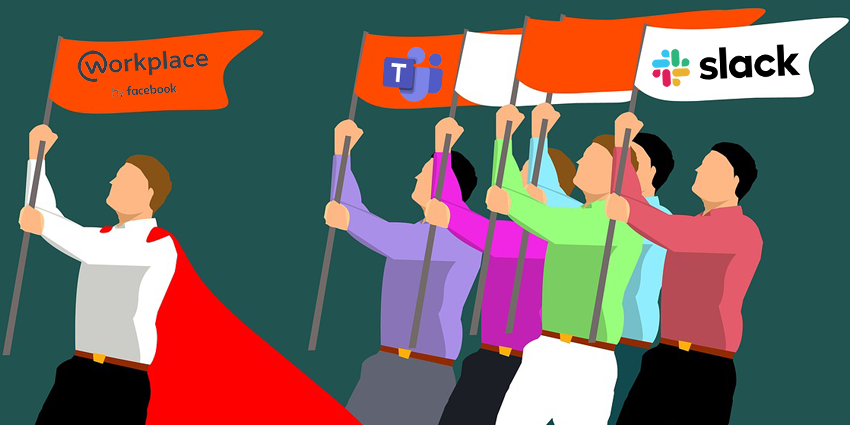In 2019, the leading consulting company ISG published a report into the changing nature of social business collaboration. The report aimed to consider some of the leading technology solutions for companies embracing the new, digital age of collaboration. According to ISG, modern social collaboration in the workplace has evolved beyond the basic intranet, to include a variety of advanced technologies, from instant messaging and chat, to video collaboration.
Everywhere, businesses are growing more accustomed to using different types of technology to communicate and connect. Social collaboration technologies like Slack, Microsoft Teams, and Workplace from Facebook, are helping team members to interact with both their colleagues and crucial information, in an immersive new environment.
The Evolution of Social Business Collaboration
According to ISG, the collaboration space in the business or enterprise landscape is seeing rapid growth. Enterprises of all sizes are beginning to focus more significantly on opportunities to work with teams that are spread all around the world. Companies no longer want to rely exclusively on the talent that they can find just in their local region. Instead, brands want to know that they can tap into the best skillsets, wherever they are. This means that we all need better technology to bring our teams together.
However, ISG defined four separate collaboration challenges faced by the enterprise today, that could be holding some teams back. Including:
- The challenge of traditional intranets: Companies that still rely on conventional intranet technology for top-down communication are struggling to make the most out of the collaborative landscape. The one-way method of communication makes it difficult to really interact with employees. Modern solutions in the team collaboration space are designed to provide more open forms of two-way dialogue between all parts of the organisation. This allows for better employee engagement and workflow
- The demand for faster communication: Employees in the digitally mature landscape need faster ways to communicate about critical topics than email. Instant messaging and chat applications could provide today’s employees with a simpler way to engage in one-on-one conversations or group chats with their team members. These tools are often crucial for people working remotely, and those on the front-line. Tools for chat and instant messaging allow teams to access a more immersive working environment. Additionally, chat and instant messaging tools can also come with the option to accelerate conversations with video or audio too. There are even tools that come with virtual assistants in the form of AI and bots
- The need for better file collaboration: Many businesses still rely on email to send multiple files over the web for editing purposes, or to gain sign-off from a business leader. Though this is a viable way of communicating, it isn’t always the most efficient. Alternatively, cloud-based solutions for file sharing and management offer an easy way to store and retrieve information. Modern collaboration solutions provide businesses with version control, co-authoring, co-editing and so much more. They can also provide custom solutions for various parts of a business and integrate seamlessly with critical work tools that people use every day
- The evolution of digital meeting solutions: Finally, ISG believes that the globalisation of our current teams and changes to working habits can sometimes put a strain on typical meeting strategies. Experienced individuals in the digital landscape increasingly expect meeting tools to provide communication and connectivity options outside of typical enterprise possibilities. Chat and communication options like team collaboration tools provide multi-channel options for communication. This ensures that people can connect seamlessly with colleagues, suppliers, customers, and contractors. ISG also thinks that leading platforms will continue to explore immersive new technologies like augmented and virtual reality when bringing people together too
Growing Competition in the Collaboration Space
ISG notes that countless companies are now emerging on the digital market, looking for ways to solve the collaboration and communication problems that businesses face each day. The enterprise social collaboration space is experiencing vast amounts of growth and competition. More importantly, businesses are focusing on bringing various aspects of collaboration together into the same unified environment, rather than asking individuals to build their own stack of collaboration tools one at a time.
To help individuals choose the collaboration service that’s best for them, the ISG provider lens also included a charge similar to the Magic Quadrant by Gartner. The chart ranked some of the leading providers in the social collaboration space as either a market challenger, contender, product challenger, or leader. While many companies were included in the report, including RingCentral with its Glip collaboration service, Cisco, and Google, the leaders chosen by ISG were:
- Microsoft (Teams)
- Slack
- Workplace by Facebook
- Igloo
According to ISG, these software solutions offer significant enhancements in productivity and communication by providing new and improved ways for people to interact. The tools can create accessible rooms and virtual workspaces where people can come together to get tasks done, even when they’re not in the same physical environment. Notably, these tools all help to reduce email usage and/or complement intranet usage. Additionally, the leaders in the quadrant integrate with a range of additional tools in the workforce.
Defining the Collaboration Leaders
The market for enterprise collaboration tools is growing at a rapid pace. Companies everywhere are looking for new ways to help their dispersed and evolving workforce work more effectively and efficiently together.
ISG noted that Microsoft is leading the market because of the robust connection between Teams and the leading Microsoft productivity suite. However, ISG also acknowledged that Workplace from Facebook is gaining a lot of customers by focusing on shared workplaces among enterprises. Workplace has gained a lot of customers since it’s initial launch, thanks in part to the familiarity of the Facebook experience. Additionally, Slack is continuing to differentiate with a growing solution, while Igloo offers a modern intranet approach that sets it apart from the crowd.
Cisco’s Webex offering didn’t land it a spot in the leadership category for the ISG quadrant, but the analyst did define Cisco as a “rising star” thanks to its rapidly increasing range of features.







